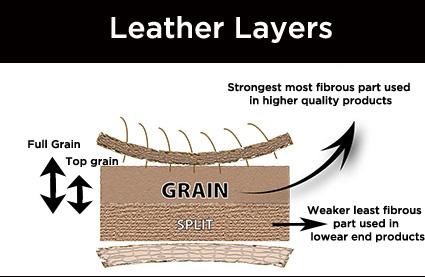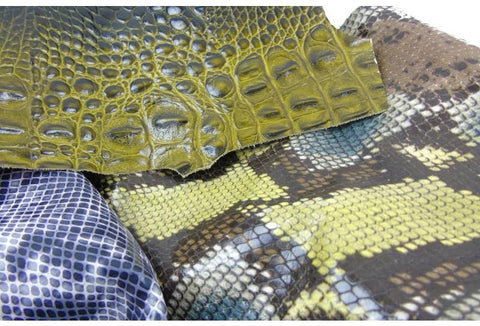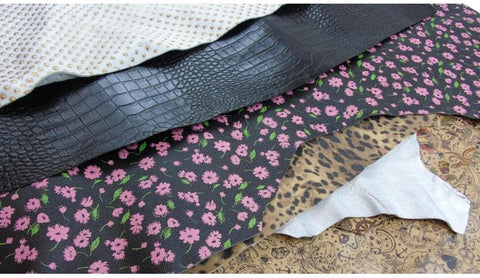A Detailed Guide to Different Types of Leather

Leather is a highly durable material made by tanning hide or skin of animals. Animal skin undergoes a preservation process i.e. a chemical treatment called tanning to convert the otherwise perishable skin to a non-decaying material called leather.
The skin of the larger animals like cow or horse is termed as hide whereas skin of smaller animals like sheep or goat is termed as skin. Leather mostly comes from cattle as a byproduct of the meat industry.
In order for leather products to last a long time, they must be properly cleaned, restored, and maintained.
Different Animal Leathers
Cow Hide – The most commonly used leather is made from cow hide that is used to produce a large variety of leather products. Leather made from the hide of the adult cow is known as the most versatile leather. The cow leather can be soft and thick and abrasion resistant which makes it a good choice of leather for heavy duty wear.
Buffalo Hide – Buffalo hide is a lot like cowhide but it can be stiffer and has more pronounced leather pattern like deeper groves and cuts. Leather made from buffalo hide can also be used in making of vests, jackets, pants, bags and can also be used for making rugged items like rugs and shoes. A jacket made from buffalo leather is extremely durable and can last a lifetime.
Lamb Skin – Sheep and lamb skin is very soft, supple and light weight. Ideally it is not recommended for making hard wearing items like motorcycle jackets but it is generally used to make garments, trench coats along with pants and gloves. This is the leather of choice for most of the big fashion houses for their jackets and purses.
Deer Skin – Leather made from the deer skin is the toughest leather available and has high tensile strength, abrasion resistant and offers high durability. The skin of the deer is extremely soft and comfortable and has a spongy feel.
The light weight, water-friendly and stretchy leather is quite expensive and is generally used for making handbags, wallets and upholstery. It was the leather of choice for Native Americans for their garments.
Goat Skin – Goat skin leather is strong, durable having smooth fine grain and is quite economical. The goat skin leather is tougher than cow leather and is supple, comfortable, light-weight and water resistant and it is relatively cheap. The goat skin leather is used for making clothes, book covers, gloves, shoes and bags.
Different Leather Grades
Leather is generally available in the following grades:
Full Grain – Full grain leather is the finest of all leathers where only the hair is removed from the epidermis and the hides have not been snuffed, sanded or buffed to remove imperfections or marks and comprises of the entire thickness of the skin.
This leather has great strength and durability as the grain remains on the skin. The full-grain leather is available in two types of finishes called aniline and semi-aniline and it is generally used for the making of highest quality furniture, luggage and footwear.
Top Grain – This is the second highest grade of leather after full grain. It is split from the top layer of blemished hide and then it is sanded and refinished to get rid of scars and scrapes. It is still strong and durable. It is mainly used for garment manufacturing. It has greater stain resistance than full grain leather if its finish is maintained.

Corrected Grain - This is a leather that has artificial grain applied to its surface and this leather does not meet the standards that is required for creating vegetable-tanned or aniline leather. The imperfections are corrected or sanded off and an artificial grain is embossed into the surface with dyes.
Split Leather – This leather grain is derived from middle and lower layers of the epidermis and is created from the fibrous part of the hide that is left after separating top-grain of the rawhide. After the hide has been bronzed, a heavy treatment is given on leather.
This leather grade is exclusively used for making suede or corrected grain leathers and is greatly preferred by furniture manufacturers for its sturdiness. Some associate this type of leather with “genuine leather” even though the term can be taken for its literal meaning as “genuine” or “real” where the maker is just trying to indicate its real leather rather than synthetic.
Information About Leather Thickness
Leather is a soft material and hence measuring its thickness is extremely difficult. The thickness of the leather is determined with a predefined area and predetermined contact pressure.
It is hard to measure uniform results over the entire skin surface because leather is not uniform in character and hence thickness measurement of the leather is regulated by national and international standards. However, leather is generally measured in terms of ounces or mm, where one ounce is equal to 1/64th of an inch thickness. Thus, 8 oz. thickness of leather means 1/8th of an inch thickness. Leather having thickness more than 1.4 mm is considered heavy grade used which is used for bags or belts.
Different leather products are made depending upon the thickness of the leather. Find below the given leather thickness that are ideal for making different products.
- 0.5 to 1.2mm leather is used for making leather jackets, pants and gloves.
- 1.0 to 2.5 mm leather is used for making wallets, leather bags, book covers
- 2.0 - 2.5 mm leather is used for making heavy duty leather bags, leather straps
- 2.8 - 3.5 mm leather is used for making belts, soles of shoes, knife sheaths
Difference Between Chrome Tanned and Vegetable Tanned Leather
Vegetable tanned leather is leather that is tanned with natural process using natural ingredients like bark of chestnut trees and by other tanneries that have a rich heritage of tanning hides. Vegetable tanning is an age-old process and relies on extended and complex process of soaking animal hides in vegetable tannin. Since, plant extracts are used for the tanning process hence the color of the finished leather has rich tones of natural browns.
Vegetable tanned leather is stronger and can withstand the daily wear and tear and with proper care can last more than a life time. This type of leather ages well developing a natural patina as you wear it.
Currently around 90% leather available in the market is chrome tanned leather that is tanned using chromium salts and tanning liquors, however it must be closely monitored to reduce environmental impact. It is a relatively new approach that was introduced to expedite the tanning process. Tanning can be processed in as little as two weeks time and cost considerably less compared to vegetable tanning.
Chrome tanned leather is available in wide variety of colors ranging from black to bright pink thereby giving good choices to the fashion industry where trends change quickly. The chrome tanned leather might fade slightly but usually shows slight color change over time. Chrome tanned leather has its own benefit like it is water resistant hence it is ideal for making products that might be subjected to heat or humidity.
Different Leather Finishes
Leather is given variety of finishes to enhance its natural beauty and some of the common finishes given to leather are Nappa, Aniline, Semi-aniline, Pigmented, Natural dry milled, Pebble Grain etc. Let’s have a close look at different finishes of leather.
Aniline dyed Leather – Aniline dyed leather is the most natural looking leather that is available as it is with the unique surface characteristics of the hide remaining visible. It does not have any surface coating of polymer and pigment and is colored only with dye. Aniline finish is completely transparent so that the original grain surface is visible and the finish is unhindered by any pigment particles.
Only the best quality skins can be used to be aniline dyed due to its transparency which makes it an expensive choice. This method of dyeing produces a very soft and luxurious feel and It is the considered the most premium quality of leather.
Semi-Aniline Finish Leather – Semi-aniline finish leather is aniline dyed or stained using a small quantity of pigment so that the natural characteristics of the hide is visible. This is first saturated in dyes and later on given light coating of dyes and pigments on the surface. The treatment of semi-transparent stains provides protection against fading but do not completely obscure the surface. This type of leather would be considered next to aniline leather.
Nappa Leather – Nappa is a general term given to represent leather that is smooth and soft. However, most nappa leathers will be made with top grain leather that is sanded down to remove the imperfections and coated with pigments. The skin selection does not have to be the best which makes this kind of leather more cost effective when compared to aniline leather.
Dry milled leather- The leather is tumbled in a large drum to produce softer more pliable leather and this process can create a slight "pebble" appearance in the surface of the leather.
Pigmented Leather – Pigmented finished leather comprises of finish having pigment particles that render completely opaque finish. This leather is given a complete plastic coating over its surface, though it allows the leather to breathe but it slows the absorption of water or any spilled drink or even leather conditioner. The natural quality of the leather is abandoned and hence it does not scratch easily. This leather finished is usually used for furniture, upholstery and car leather and leather jackets that need to be waterproof.
Nubuck and Suede Leather
Both Nubuck and suede are leather that is buffed to produce a velvety soft feel. The major difference is that Nubuck is sanded on the grain surface of the leather whereas suede is sanded on the flesh side of the skin.
The grain side is the toughest part of the leather therefore Nubuck tends to be more durable than suede which makes it a more expensive option. Suede being made from split end of the hide is softer, porous and less resistant to scuffs and stains.
Embossed Leather

Embossed leather is made by stamping the leather using heat and high pressure to create a specific pattern or design in the hide or to represent that natural grain of the hide. There is different variety of embossed leather ranging from crocodile, snake, alligator, flowers, saffiano and other patterns.
Stamping of pattern onto the leather gives a creative and decorative look to leather that is also water and oil repellent. The thermo-leather treatment on the embossed leather reduces the overheating of hides when exposed to the sun.
Crocodile Print Leather – Leather that is imparted a decorative look by stamping or pressing the surface of the leather to create an impression and provide a look and feel of crocodile is termed as crocodile print leather.
Snake Print Leather - The snake pattern is applied on the leather surface with extreme pressure to raise the snake design on the surface of the leather. This is basically done to give the leather a different texture and appearance of a snake. The embossed leather will look like snake skin.
Saffiano Print Leather - Saffiano print leather is a textured leather that is made with the texture pressed on it by a machine giving the leather a cross-hatch finish. It is also finished with a wax treatment due to which the leather is scratch resistant, durable and easy to clean. Many major fashion brands have their purses made with this leather.
Graphics Printing on Leather

Leather being a widely used material for producing clothes, shoes, purses and several other everyday items, it is now-a-days also printed with amazing graphics to turn it into one-of-a-kind custom products. Today printing graphics onto leather make it use for variety of applications across diverse markets. Right from high-end fashion wear and accessories to automotive and home interiors, graphics printed leather is in great demand.
Graphics printing on leather is basically done for customization of promotional items like leather bracelets, key chains, laptop covers etc. Express your creativity by getting a custom leather jacket with graphics printed.
Printed leather such as Camouflage print and leopard print leather is also available at Lusso Leather.
Find out more:
























![How to Darken Leather [2025 Updated]](http://lussoleather.com/cdn/shop/articles/how-to-darken-leather.png?v=1738558666&width=1080)
































































